2026
Rémi Cardon is taking part in the organization of READIxTSAR workshop that will be held in Palma de Mallorca, 11th May 2026 collocated with LREC 2026.
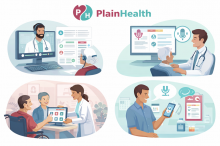
We are happy to share that the project 🏥 “PlainHealth: Regulated Accessible Technology for Easier Communication and Interaction in Healthcare” (PDC2025-166375-I00) 👨⚕️ has been proposed for funding in the call for proposals “Proyectos Prueba de concepto” 2025 by the Spanish Research Agency.
2025
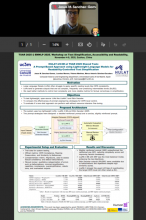
El grupo HULAT ha participado en la tarea TSAR (Readability-Controlled Text Simplification), celebrada en el marco del congreso EMNLP 2025 (Empirical Methods in Natural Language Processing) en Suzhou, China. Esta tarea ha consistido en la simplificación de textos con control de legibilidad, con el objetivo de generar simplificaciones de textos que se ajusten a un nivel de legibilidad específico, definido según el Marco Común Europeo de Referencia para las Lenguas (MCER).
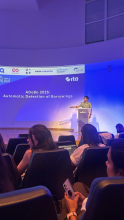
El grupo HULAT consiguió el cuarto puesto en la tarea ADoBo 2025 (https://adobo-task.github.io/) en IberLEF 2025. Esta tarea tiene como objetivo la detección automática de anglicismos en textos en español.
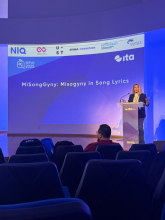
El grupo HULAT ha logrado el primer puesto en las dos tareas de la competición MiSonGyny (https://sites.google.com/view/misongyny) en IberLEF 2025. Este challenge está enfocado en la detección avanzada de contenido misógino en letras de canciones escritas en español.
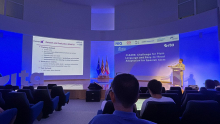
El equipo HULAT-UC3M ha conseguido el primer puesto en una de las subtareas de CLEARS (Challenge for Plain Language and Easy-to-Read Adaptation for Spanish texts, https://sites.google.com/gcloud.ua.es/clears) en IberLEF 2025. Esta subtarea ha consistido en la adaptación de textos complejos en español a Lenguaje Claro.
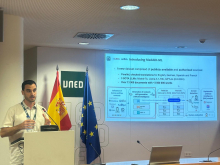
On September 11, the HULAT (Human Language Technologies) research group, in collaboration with the Spanish National Research Council (CSIC) and TU Wien (Vienna University of Technology), presented their paper “MedAID-ML: A Multilingual Dataset of Biomedical Texts for Detecting AI-Generated Content” at the renowned international conference CLEF (Conference and Labs of the Evaluation Forum).
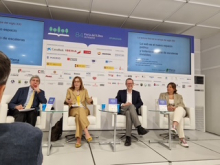
On June 11th, Lourdes Moreno participated alongside María Xesús Bello Rivas and Óscar García Muñoz in an event on easy-to-read language and cognitive accessibility. At the HULAT group, we are working on the HumanAI project in these areas.
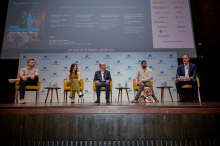
On Thursday, 5 June, researchers Israel González Carrasco and Jose Luis López Cuadrado participated in the conference ‘Digital Accessibility: An inclusive future’, organised by the VASS Foundation and held at CaixaForum Madrid. This conference brought together experts from the public, private, and third sectors to address the impact of the new European regulations that come into force on 28 June 2025.

El 12 de febrero 2025 miembros de HULAT, The Basement y Fundación AMAS tuvieron una reunión para trabajar en un caso de uso del proyecto ZERO cuya finalidad mejorar la movilidad urbana de personas con discapacidad intelectual, facilitando su desplazamiento autónomo en transporte público para acceder a su lugar de trabajo y otras actividades diarias.
 We are happy to share that the project 🏥 “PlainHealth: Regulated Accessible Technology for Easier Communication and Interaction in Healthcare” (PDC2025-166375-I00) 👨⚕️ has been proposed for funding in the call for proposals “Proyectos Prueba de concepto” 2025 by the Spanish Research Agency.
We are happy to share that the project 🏥 “PlainHealth: Regulated Accessible Technology for Easier Communication and Interaction in Healthcare” (PDC2025-166375-I00) 👨⚕️ has been proposed for funding in the call for proposals “Proyectos Prueba de concepto” 2025 by the Spanish Research Agency.
 El grupo HULAT consiguió el cuarto puesto en la tarea ADoBo 2025 (https://adobo-task.github.io/) en IberLEF 2025. Esta tarea tiene como objetivo la detección automática de anglicismos en textos en español.
El grupo HULAT consiguió el cuarto puesto en la tarea ADoBo 2025 (https://adobo-task.github.io/) en IberLEF 2025. Esta tarea tiene como objetivo la detección automática de anglicismos en textos en español.
 El grupo HULAT ha logrado el primer puesto en las dos tareas de la competición MiSonGyny (https://sites.google.com/view/misongyny) en IberLEF 2025. Este challenge está enfocado en la detección avanzada de contenido misógino en letras de canciones escritas en español.
El grupo HULAT ha logrado el primer puesto en las dos tareas de la competición MiSonGyny (https://sites.google.com/view/misongyny) en IberLEF 2025. Este challenge está enfocado en la detección avanzada de contenido misógino en letras de canciones escritas en español.
 El equipo HULAT-UC3M ha conseguido el primer puesto en una de las subtareas de CLEARS (Challenge for Plain Language and Easy-to-Read Adaptation for Spanish texts, https://sites.google.com/gcloud.ua.es/clears) en IberLEF 2025. Esta subtarea ha consistido en la adaptación de textos complejos en español a Lenguaje Claro.
El equipo HULAT-UC3M ha conseguido el primer puesto en una de las subtareas de CLEARS (Challenge for Plain Language and Easy-to-Read Adaptation for Spanish texts, https://sites.google.com/gcloud.ua.es/clears) en IberLEF 2025. Esta subtarea ha consistido en la adaptación de textos complejos en español a Lenguaje Claro.
 On September 11, the HULAT (Human Language Technologies) research group, in collaboration with the Spanish National Research Council (CSIC) and TU Wien (Vienna University of Technology), presented their paper “MedAID-ML: A Multilingual Dataset of Biomedical Texts for Detecting AI-Generated Content” at the renowned international conference CLEF (Conference and Labs of the Evaluation Forum).
On September 11, the HULAT (Human Language Technologies) research group, in collaboration with the Spanish National Research Council (CSIC) and TU Wien (Vienna University of Technology), presented their paper “MedAID-ML: A Multilingual Dataset of Biomedical Texts for Detecting AI-Generated Content” at the renowned international conference CLEF (Conference and Labs of the Evaluation Forum).
 On June 11th, Lourdes Moreno participated alongside María Xesús Bello Rivas and Óscar García Muñoz in an event on easy-to-read language and cognitive accessibility. At the HULAT group, we are working on the HumanAI project in these areas.
On June 11th, Lourdes Moreno participated alongside María Xesús Bello Rivas and Óscar García Muñoz in an event on easy-to-read language and cognitive accessibility. At the HULAT group, we are working on the HumanAI project in these areas.
 On Thursday, 5 June, researchers Israel González Carrasco and Jose Luis López Cuadrado participated in the conference ‘Digital Accessibility: An inclusive future’, organised by the VASS Foundation and held at CaixaForum Madrid. This conference brought together experts from the public, private, and third sectors to address the impact of the new European regulations that come into force on 28 June 2025.
On Thursday, 5 June, researchers Israel González Carrasco and Jose Luis López Cuadrado participated in the conference ‘Digital Accessibility: An inclusive future’, organised by the VASS Foundation and held at CaixaForum Madrid. This conference brought together experts from the public, private, and third sectors to address the impact of the new European regulations that come into force on 28 June 2025.
 El 12 de febrero 2025 miembros de HULAT, The Basement y Fundación AMAS tuvieron una reunión para trabajar en un caso de uso del proyecto ZERO cuya finalidad mejorar la movilidad urbana de personas con discapacidad intelectual, facilitando su desplazamiento autónomo en transporte público para acceder a su lugar de trabajo y otras actividades diarias.
El 12 de febrero 2025 miembros de HULAT, The Basement y Fundación AMAS tuvieron una reunión para trabajar en un caso de uso del proyecto ZERO cuya finalidad mejorar la movilidad urbana de personas con discapacidad intelectual, facilitando su desplazamiento autónomo en transporte público para acceder a su lugar de trabajo y otras actividades diarias.
